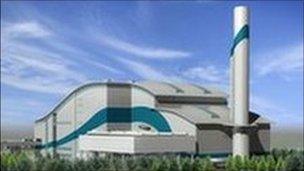King's Lynn incinerator plan tackled by judicial review
- Published

The legal case against the incinerator could take up to two years to come to court
Campaigners against a waste incinerator being built in King's Lynn have served notice on Norfolk County Council that they are seeking a judicial review.
It means the courts could look at the way the council decided to commission the £500m facility at Saddlebow.
The action is being taken by campaigner Michael de Whalley, who claimed there were irregularities with the way the council awarded the contract.
The county council said it had "complete confidence in the process".
Mr de Whalley said: "We've investigated the evidence that we have and it's come up pretty clear that there are irregularities with the way Norfolk County Council have awarded the contract and made their decisions."
Fundraising appeal
He said he had sought a protective costs order to limit his liability for Norfolk County Council's costs if it emerged the winner.
"We don't know how much it will cost but it is likely to run into tens of thousands," he said.
"We have begun an appeal through the local newspaper and in just a week we have received £2,500."
In February a King's Lynn and West Norfolk borough-wide referendum overwhelmingly rejected a plan to build a waste incinerator.
More than 92% of those taking part in the poll voted against the proposal, from a turnout of more than 61%.
A county council spokesperson said: "Norfolk County Council can confirm that the council has received notification of action being taken to seek judicial review of the decision taken by cabinet on 7 March 2011 to award the waste PFI contract.
"The county council has complete confidence in the process it followed in deciding to award this contract."
Norfolk County Council has appointed the company Cory Wheelabrator to build and run the plant.
The facility would process about 260,000 tonnes of rubbish every year.
The council said it would also save £8m a year that would otherwise be spent sending rubbish to landfill sites.
The new facility would burn the waste and produce enough electricity for 36,000 homes.
- Published1 March 2011
- Published8 February 2011
- Published25 November 2010
- Published27 October 2010